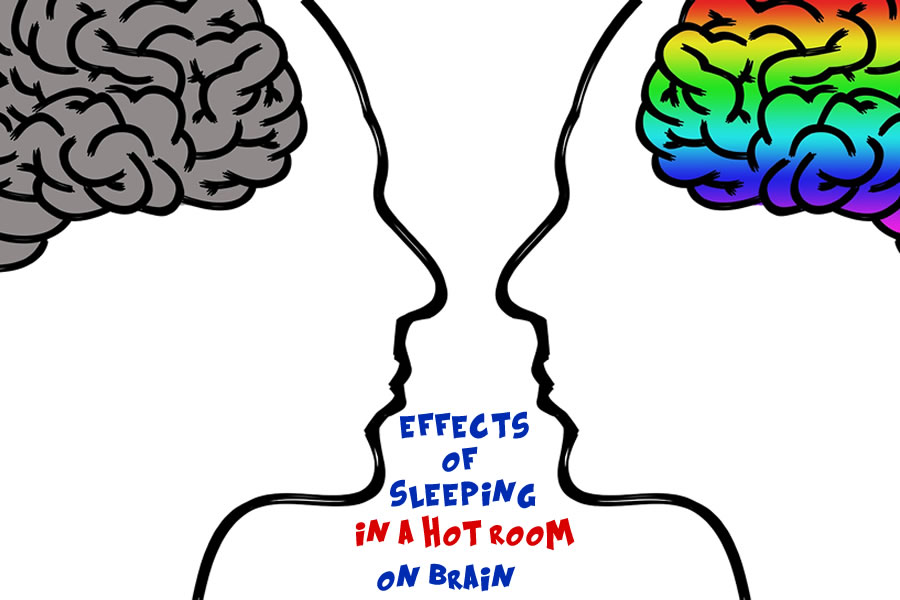How Sleeping in a Hot Room Affects Your Brain Health
By Oktay Ozadam

Lower test scores? Slower reaction times? Decreased productivity? Can we attribute compromised brain function to hot temperatures? According to research, we can. Sleeping in a hot room negatively impacts our cognitive function.
Only recently did researchers link temperature to our circadian rhythms. While they always attributed disruption in sleep cycles to being awake when it was dark or being asleep when it was light, researchers are just now connecting temperature to those disruptions, as well.
"Light is a well-known driver of the body clock, but until recently other factors including temperature have been overlooked" said Professor Joerg Albert, Professor of Sensory Biology and Biophysics at University College London.
Our body expects the temperature to fall when the day grows dark, just as our body expects to go to sleep when it grows dark. Now, it turns out our body also expects the temperature to drop when it becomes dark and expects the temperature to drop when we fall asleep.
An Ideal Temperature
Whether you're a hot or cold sleeper, temperature significantly impacts your sleep quality. Your body temperature decreases in its attempt to fall asleep.
It is suggested that your bedroom temperature should be between 60°-67°F for optimal sleep, and if the temperature is much lower or much higher, you will have a harder time falling asleep and staying asleep, not to mention your sleep will be disrupted by the temperature.
The National Sleep Foundation's research shows that there seems to be an ideal temperature for sleep. When your temperature is very high, it takes you longer to fall asleep, and once you achieve sleep, it is fragmented, resulting in less dreaming.
How does this affect brain function?
"When you go to sleep, your set point for the temperature your brain is trying to achieve goes down," says H. Craig Heller, PhD, a professor of biology at Stanford University, who wrote a chapter on temperature and sleep for a medical textbook.
Regarding the brain and sleep, a number of studies suggest sleeping in warm temperatures has negative impacts on people, notably on their cognitive function.
"To our surprise, we found very significant effect of detrimental cognitive function among those students that we included in our study that didn't have air conditioning during this heat wave period," said Jose Guillermo Cedeno-Laurent, a professor and researcher at Harvard's School of Public Health, who led a 12-day experiment comparing students who slept in a room with air conditioning to those who slept in a room without during a heat wave in Boston.
The study measured the students' physical activity, heart rate, perspiration, and the amount of caffeine consumed. The students who slept without air conditioning performed 13% worse on tests than the students who slept with air conditioning.
Experiencing decreased scores across five measures, including reaction times and memory, the students who slept without air conditioning were also less accurate than their air-conditioned counterparts. Harvard plans to extend its research to learn how heat may impact the ability to learn, economic productivity, and workplace safety in larger populations.
The Laboratoire de Physiologie et de Psychologie Environnementales of Strasbourg, France exposed six men to 95°F temperature over the course of five days to discover a reduction in sleep time, an increase in wakefulness, as well as fragmented sleep patterns resulting in shorter REM episodes.
Stanford University published a study in Nature Climate Change, suggesting hotter temperatures lead to more suicides, exposing the relationship between temperature and suicide and depression. A one-degree Celsius increase in average monthly temperature correlated with increases both the United States' and Mexico's monthly suicide rate.
And New York City public schools discovered high school graduation exams distributed during hot weather resulted in lower passing rates.
Sleeping for Brain Health
Just as we are conditioned to reduce screen time before bed, we can condition ourselves to reduce temperatures before bed. As part of a nighttime ritual of calming our minds, breathing deeply, and turning the lights low or using smart bed cooling systems, we can turn the temperature down in our sleeping quarters. Not only will we fall asleep faster, stay asleep longer, and enjoy deeper sleep, but we will also benefit from better brain function when we awake.